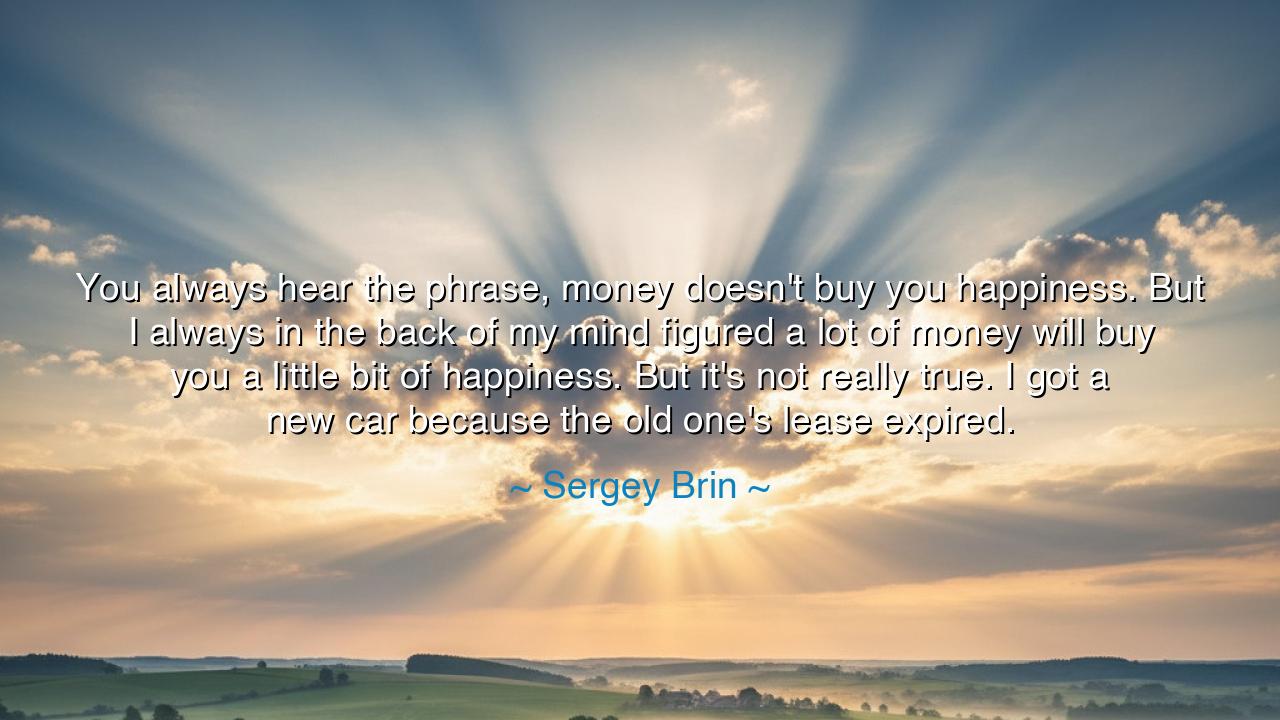
You always hear the phrase, money doesn't buy you happiness. But
You always hear the phrase, money doesn't buy you happiness. But I always in the back of my mind figured a lot of money will buy you a little bit of happiness. But it's not really true. I got a new car because the old one's lease expired.






In the words of Sergey Brin, “You always hear the phrase, money doesn’t buy you happiness. But I always in the back of my mind figured a lot of money will buy you a little bit of happiness. But it’s not really true. I got a new car because the old one’s lease expired.” These words, spoken by one of the founders of Google, echo a paradox as old as humanity itself — that wealth, though powerful, cannot purchase the quiet joy of the heart. Coming from a man who rose from humble beginnings to immense prosperity, this admission is not a denial of success, but an illumination of its limits. It is the voice of experience whispering through the noise of desire: true happiness is not sold in any market.
The origin of this quote lies in Brin’s reflections on life after achieving extraordinary financial success. Having co-founded one of the most influential companies in history, he attained the kind of wealth that most people can scarcely imagine. Yet in his words, we hear neither boast nor arrogance — only clarity. He admits that, like many, he once believed that money could buy a measure of happiness, if not all. But with time and experience, he learned that while money can buy convenience, it cannot buy contentment. A new car, no matter how beautiful, loses its luster once the thrill fades. The body may ride in luxury, but the soul remains untouched by its shine.
The ancients spoke this same truth in their own way. Epicurus, the philosopher of simple pleasures, taught that wealth and power do not bring peace; only a tranquil mind does. Marcus Aurelius, the philosopher-emperor, ruled the known world and yet wrote in his meditations, “A man’s wealth is the good he does in the world.” Even King Solomon, in all his splendor, lamented that riches and pleasures are “vanity and chasing after wind.” Thus, from the marble halls of Rome to the golden deserts of Jerusalem, and now to the glass towers of Silicon Valley, the truth resounds unchanged: happiness is not found in possessions, but in perception.
Brin’s example reveals this truth with modern irony. Here is a man who could afford a thousand cars, yet speaks of replacing his only because its lease expired — a practical necessity, not an act of indulgence. In that moment, he becomes not the titan of technology, but simply a man acknowledging the fleeting satisfaction of things. His wealth gave him ease, but not exaltation; comfort, but not joy. The happiness he once imagined money might provide proved as temporary as the shine of a new vehicle. This recognition is not defeat — it is awakening. For the soul that sees through illusion has already begun to taste wisdom.
Consider also the story of Howard Hughes, one of the wealthiest men of the twentieth century. He owned empires, aircraft, and acclaim — yet died alone, tormented by paranoia and loneliness. His riches built him walls, not peace. Or think of Diogenes, the philosopher who lived in a barrel and laughed at kings, claiming he had all he needed in the sun. When Alexander the Great asked what he could give him, Diogenes replied, “Stand aside — you are blocking my light.” These two lives, opposite in luxury, reveal the same lesson: the man who has enough within is richer than the man who owns the world.
Brin’s words, therefore, serve not as a rejection of prosperity, but as a redefinition of value. Money can serve the body — it can buy food, comfort, medicine, and opportunity — but it cannot nourish the spirit. The spirit hungers for meaning, for connection, for creation. Happiness, he implies, comes not from what we purchase, but from what we become. When our worth depends on possessions, we live in chains; when it depends on purpose, we live in freedom.
The lesson, then, is clear and timeless: seek wealth of the soul, not of the pocket. Let money serve your life, but never rule it. Find joy not in the things you own, but in the peace you feel when you create, when you give, when you love. Practice gratitude for what you already have, for gratitude turns ordinary moments into treasures. And remember — the happiest man is not the one who has the most, but the one who needs the least.
So, O listener, hear the wisdom behind Sergey Brin’s humble confession. Even in an age of billionaires and boundless consumption, the old truth stands unshaken: happiness cannot be bought; it must be built. The car will rust, the fortune will fade, but the light of a contented heart endures. Learn, then, to measure your wealth not by what fills your hands, but by what fills your soul. For in that quiet richness — in love, in gratitude, in purpose — you will find the only treasure that lasts beyond the lease of this brief life.






AAdministratorAdministrator
Welcome, honored guests. Please leave a comment, we will respond soon